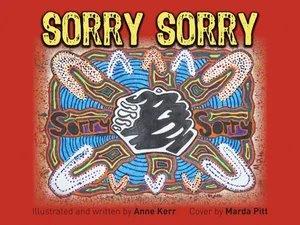‘Sorry Sorry’ is a picture book with a strong message. The author, Anne Kerr, is a kindergarten educator with 25 years experience teaching children ages three to five years. She states that she has created ‘Sorry Sorry’ as a platform to open discussion about the topics in this book. The jacket cover has been created by Aboriginal artist, Marda Pitt, a Tjungundji woman from old Mapoon, Western Cape York. Her symbolic artwork represents people building relationships by coming together and sharing stories. The word, ‘Sorry’ is shown along pathways towards the inner circle to represent the ongoing journey of reconciliation.
‘Sorry Sorry’ aims to be a ‘true story’ of Australia’s history aimed at young children. It retells the point of contact between First Nations people and white people’s arrival. The scene opens by the water as Australia’s First Nations people are hunting and fishing while their children are collecting shells and splashing in the sea. They observe a ‘big white cloud’ on the horizon. As it nears the shore, the First People see a huge canoe coming ashore. The story says that the boat’s friendly people hopped out of their small canoe, said hello, then everyone laughs, plays and dances together.
Time passes and more people arrive. The First Nations people share their lands and knowledge of hunting and gathering food. The tenor of this initially happy story changes as more canoes arrive. The First Peoples worry about their land, birds and animals. Trees are cleared for houses and the bush becomes roads. The new arrivals force the First Peoples to leave their land, homes and food sources. They became sad and sick. The story takes a sharp turn when the ‘Others’ recognise their actions as unfair. They are sorry and realise how sad the First Peoples had become. They recognise what has happened to the land and animals. They feel ashamed and say, ‘Sorry’. The final pages of the story show the two groups sitting down together with the aim of understanding each other, becoming friends and together caring for Australia’s land and animals.
The illustrations feature humans as black and white stick figures with simplified settings such as a child might draw. Landscapes, boats and the build up of houses and roads are equally simplified. The story concludes with a joyful scene where black and white stick figures are dancing together. The book includes four teaching pages with suggestions for using the book. There are conversation starters, suggestions for drama, a very brief historical note that this story is ‘like what happened when Europeans first came and settled in Australia’. There are brief comments on environmental protection and social skills.
A different approach to recounting historical perspectives and discussing reconciliation with children is the book written by Coral Vass, ‘Sorry Day’, illustrated by Dub Leffler, NLA Publishing, 2018. Reconciliation is presented through a fictional story centering on a white and an Aboriginal child. It too aims to offer a discussion point for children and adults together. It was awarded the 2019 Eve Pownall Award for Information Books by The Children’s Book Council of Australia.

